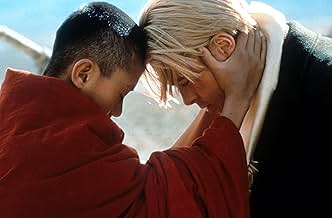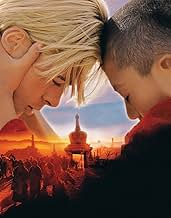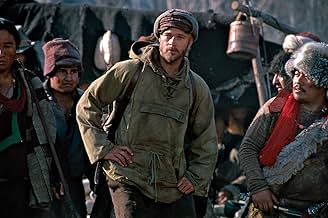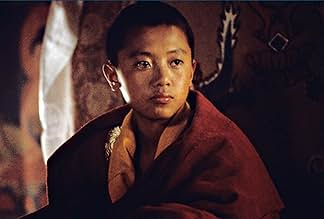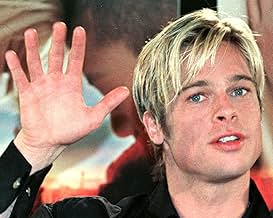Heinrich Harrer, an Austrian climber and Nazi supporter, breaks out of a British POW camp in India and treks to the holy city of Lhasa where he's employed as an instructor to the young 14th ... Read allHeinrich Harrer, an Austrian climber and Nazi supporter, breaks out of a British POW camp in India and treks to the holy city of Lhasa where he's employed as an instructor to the young 14th Dalai Lama and soon becomes his close confidante.Heinrich Harrer, an Austrian climber and Nazi supporter, breaks out of a British POW camp in India and treks to the holy city of Lhasa where he's employed as an instructor to the young 14th Dalai Lama and soon becomes his close confidante.
- Awards
- 3 wins & 8 nominations total
- Ngawang Jigme
- (as B.D. Wong)
- Lord Chamberlain
- (as Ven. Ngawang Chojor)
- Director
- Writers
- All cast & crew
- Production, box office & more at IMDbPro
Featured reviews
It's not all surface though, there's depth here too. Don't believe the negative comments about Brad Pitt's acting. Admittedly his accent slips a bit in places, but he does a great job as Heinrich, both the unpleasant, arrogant character at the beginning, and the more gentle and wise man that he becomes as the film progresses. His relationship with the young Dalai Lama (a very impressive actor) is an unusual one and refreshingly unsentimental. The film is well edited; scenes are not drawn out any longer than they need to be. As a whole, it is fast paced but also peaceful, tender and moving. You don't get bored but you're not bombarded with pointless action scenes either.
It's a pleasant surprise to see a Hollywood film where women and other cultures aren't treated as objects, and are allowed to be full, complex characters. It could be argued that this film has a Western perspective, but after all, it is adapted from a book written by a European living in Tibet, and intended for Western audiences. It treats the Tibetan culture with a great deal of respect, so I don't really see a problem with that. Similarly, those who have complained that it doesn't tell you enough about the Dalai Lama and too much about Heinrich, ultimately it is Heinrich's story, and that is its strength: that it is one man's tale, and not a political polemic. It gives you a great sense of how people's stories intersect and how the whole world is connected.
Overall, an unusual film, very involving and emotional without sentimentality, with wonderful music and outstanding cinematography. Highly recommended.
This film has a European pace unsuitable for those addicted to action figure movies with huge budgets and high body counts. I recommend it as a "good view" similar to a good read.
It needs about 2/3 of the time to show what a bad guy Heinrich Harrer actually is and only 1/3 of the time to show how he changes and gradually becomes a good man. All he thinks about is his career as a mountain climber. In 1939, just before World War II, his wife is pregnant with their first child. Harrer doesn't want to take up his responsibility and 'flees' from her by going to Tibet, where he will try to conquer Mount Nanga Parbat in the Himalayas. Because he is an Austrian and because the Nazi's already have taken over power in Austria, they will use his successes to prove that the Germans are the best race (I hope I don't have to explain the entire Nazi ideology to you, but that you paid enough attention during history class). During his attempt to reach the summit he is arrested by the British and taken to a POW-camp. After several attempts to escape he finally succeeds and together with Peter Aufschnaiter he succeeds to reach Tibet. First he is his old, bad self, but gradually he changes his lifestyle and becomes more 'Tibetan'. He even knows to get the attention of the very young Dalai Lama and becomes friends with him during the period that the Chinese took over power in Tibet.
I don't know if all that is shown in this movie actually happened or to which extent some parts have been made up. Of course it is all a bit politically 'colored' (the Tibetan question is still not solved until today and so there will always be people who will choose China's side and say that what is shown here is completely wrong), but that doesn't mean that this movie doesn't carry a powerful message. But even without this message of being a good husband and not being a career driven jerk, the philosophical Tibetan approach to problems... this movie is very nice eye candy. The landscapes are absolutely stunning and Tibet really looks like a place that certainly is worth a visit. The acting is very good and it all looks very believable.
So despite the fact that this movie dragged on from time to time and that it should have been a bit shorter, this still is a very nice film. I give it a 7/10, perhaps even a 7.5/10.
Did you know
- TriviaJetsun Pema is the real-life sister of The Dalai Lama. In this film she plays the mother of The Dalai Lama and hence her own mother.
- GoofsThe movie depicts the Dalai Lama's coronation occurring after Germany surrenders in WWII and after China invades Tibet. The actual enthronement ceremony took place on 22 February 1940, (Iron-Dragon Year, 1st month, 14th day), long before the end of the war and the Chinese invasion. On 17 November 1950, the Dalai Lama assumed full temporal (political) power over Tibet which was more than 10 years after his enthronement ceremony.
- Quotes
Dalai Lama: We have a saying in Tibet: If a problem can be solved there is no use worrying about it. If it can't be solved, worrying will do no good.
- Crazy creditsAs the end credits roll, a view of the mountains of Tibet is seen.
- SoundtracksPurification Et Benediction
Performed by Monks of Namgyal Monastere
Details
- Release date
- Country of origin
- Official site
- Languages
- Also known as
- Siete Años en el Tíbet
- Filming locations
- Production companies
- See more company credits at IMDbPro
Box office
- Budget
- $70,000,000 (estimated)
- Gross US & Canada
- $37,957,682
- Opening weekend US & Canada
- $10,020,378
- Oct 12, 1997
- Gross worldwide
- $131,457,682
- Runtime
- 2h 16m(136 min)
- Color
- Sound mix
- Aspect ratio
- 2.39 : 1



